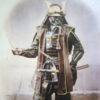Bushido is a diverse body of philosophy, and it is strongly linked to the Japanese religion of Shintoism. Shintoism and Ma’at (the native religion of Egypt) are very similar. They are tied to the forces of nature and the land. Holding them sacred, but also having a sense of divine order and humans connection to the land.
Many of the concepts behind Bushido aren’t what they would seem to westerners. For them, the island of Nippon was sacred. It wasn’t about owning territory. It was about honouring and protecting the ancestors and the gods. So in a sense, the Samurai were like the western concept of the Paladin, not fighting for political power so much as to protect the divine order and uphold justice.
The teachings of Bushido were diverse, and they were an education of themselves including more than martial training and discipline. But one of the sticking points for western thinkers is the state of mind that a Samurai sought to cultivate. They often mistake the intent. In a sense, what they sought was a transcendent dedication. They were transformed by their discipline into an agent of heaven. The emperor, when they had one, was seen as the Son of Heaven. He literally was the embodiment of divine order, and the fall of a dynasty was considered a woeful thing but wasn’t blamed on the spirit. If unrest happened, it was considered a human failing and a dishonour to the ancestors. This is why the Samurai could not accept defeat. It would show insufficient dedication to the truth of their ideals. Death before dishonour and to fail the civil order including to fail to protect the lands that were your responsibility.
Officially a Samurai owned little. He was responsible for the fields and security of his lands, but these belonged to the Emperor. Which means they basically belonged to heaven. If by greedy taxation there is abuse, his land suffered. He has transgressed not only against the politics of the land, but against spirit itself.
Bushido took the teachings of Buddhism to heart. So to be hesitant to keep the way was selfish. A life spent in protecting the order was honourable, and to continue past failure was to shame not only yourself, but those in your line who did give their lives in service. If a group of bandits robbed your village and terrorized the people, it was on your head.
What did the order entail? Respect for the ancestors. Which meant holding the lands of your ancestors. Because it wouldn’t have happened if the way had been maintained appropriately? Yes.
A murder was considered dishonourable. If a house had a reputation for murder it could be grounds for war. Just because of the violation of the code, others would hold the dishonoured house in disgust.
Your thoughts are welcome. Be well friends.
Travis Saunders
Dragon Intuitive
~science,mysticism,spirituality~



Leave a Reply